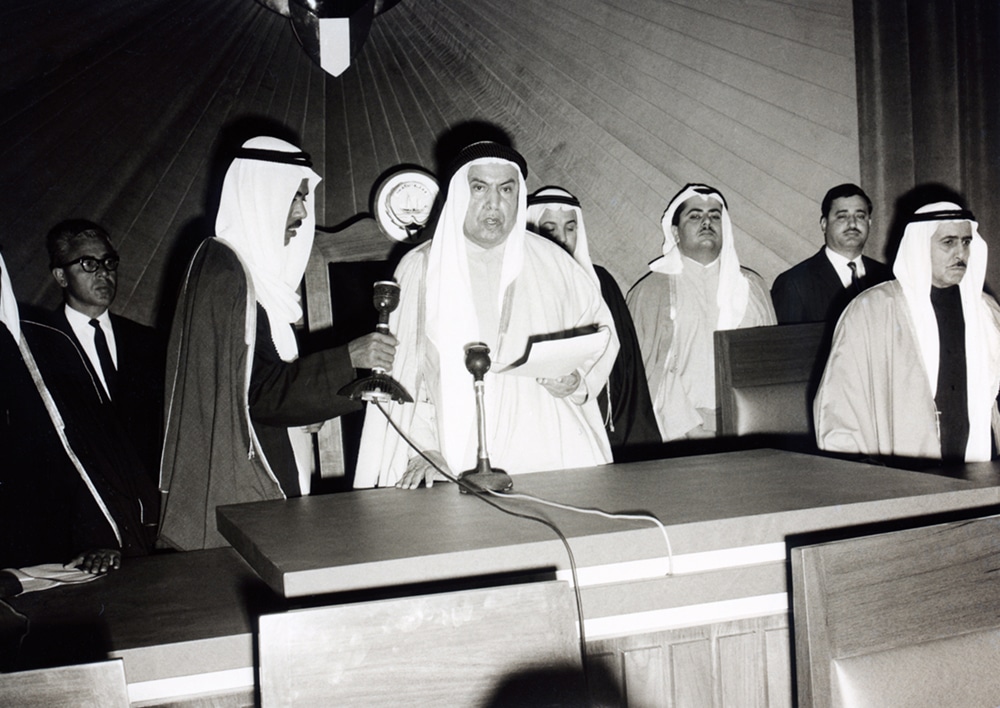By Khaled Al-Abdulhadi
KUWAIT: The history of the Kuwaiti parliament has been a mix of turmoil and significant leaps of progress, which have shaped the identity of Kuwaiti politics. The National Assembly has its own flavor, full of exciting, confusing, joyous and unscripted actions.
 The late Jassem Al-Kharafi, who served as speaker of the parliament from 1999 to 2011, is seen when he was unanimously elected as speaker by all members of the parliament in 2009.
The late Jassem Al-Kharafi, who served as speaker of the parliament from 1999 to 2011, is seen when he was unanimously elected as speaker by all members of the parliament in 2009.Founding of the parliament
The Kuwaiti parliament first met in 1963 after Kuwait gained its independence from Britain, under the reign of late Amir Sheikh Abdullah Al-Salem Al-Jaber Al-Sabah. During the first session of the National Assembly, Sheikh Abdullah recited a poem three times: “Things are guided to the people of opinion if they are good. If a regime dominates, the wicked will lead. People don’t fix chaos when they lack moderation, and there is no moderation if ignorance prevails.”
The speaker of the largest number of National Assembly sessions was the late Jassem Al-Kharafi, who served as speaker of the parliament from 1999 to 2011, holding the office longer than anyone, and having been the only speaker to be unanimously elected by all members of the parliament.
Women’s suffrage
In 2006, women’s suffrage was obtained, which saw five women being elected to the parliament. Women used a number of approaches to achieve their goals, including lobbying, demonstration, marches, rallies and mock elections, until they were finally allowed to participate.
Securing succession
The Washington Institute of Near East Policy said the role of the National Assembly became more important in 2006 when the parliament unanimously elected late Amir Sheikh Sabah Al-Ahmad A-Jaber Al-Sabah, stating: “If one is to appreciate the intensity and complexity of the factional struggle that took place in Kuwait after 2006 and particularly during the period from 2011 to 2014, it is necessary to comprehend the role of the National Assembly in the succession process. Article 4 of Kuwait’s 1962 constitution regulates matters of succession and stipulates that the incoming Amir’s choice of crown prince needs to be approved by an absolute majority in the National Assembly.”
Turmoil and a different era
In 2013 parliament was the first to serve its full term after a series of dissolvements, the last of which was the December 2012 parliament, which was dissolved in June 2013. There were 329 candidates (321 men and 8 women), with 48 seats won by men and two by women in the elections, who in turn elected Marzouq Al-Ghanem as speaker of the parliament.
The Inter-Parliamentary Union records: “This was the third snap election in 17 months and followed the constitutional court’s June 2013 decision ordering the dissolution, on procedural grounds, of the legislature elected in December 2012. The court upheld the 2012 amendments to the electoral law reducing the number of votes per eligible voter from four to one. The amendments had triggered an opposition boycott in the December 2012 election.
“While some opposition figures again boycotted the 2013 election - they believed the electoral law favors pro-government candidates - many tribal groups and liberal candidates participated. Most candidates focused on local issues such as employment, housing, healthcare and education.”
The 2020 and 2022 sessions ended prematurely due to the dissolvement of parliament and the annulment of the elections respectively. Third time was the charm in 2013; would 2023 also be a good year for the National Assembly?











